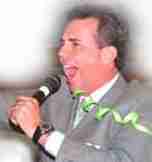

|
|
|
|
|
|
Graphology Malcolm McLeod — The Handwriting Guy
Add a Comment
Has Malcolm McLeod discovered a foolproof way of evaluating people, without even meeting them? Should his description of people override all the other evidence we can discern about their character? Does graphology even work, even remotely? No. It's all a scam.
|
|
Basics of Graphology
What is Graphology or Handwriting Analysis?
Malcolm McLeod and Graphology
Who is Malcolm McLeod? What is Graphology or Handwriting Analysis? Graphology is the analysis of handwriting in order to determine that person's character. Other similar methods of determining a person's character are:
All these have been thoroughly debunked. They are all a pseudoscience based on a superstition. Graphology belongs to the same family. History of Handwriting Analysis The idea of handwriting analysis was known to the ancient Greeks, Romans, Chinese, Jews and early Christians. A resurgence occurred in the 17th century, the term "graphology" being coined by a Catholic cleric in the mid-1800s. The basics of graphology haven't really changed since then. How can your character be reflected in your style of handwriting? Well, the favourite claim of graphologists is that "Handwriting is brainwriting". By this they mean that your personality (ie. your brain), dictates your handwriting style. They believe that you have no conscious control over your handwriting style and that your innate character traits will always shine through, traits such as honesty, generosity, optimism, temper, intelligence, friendliness, dominance, leadership, reliability and even sexual orientation. Your personality will be reflected in your handwriting because your brain causes your personality and your brain causes your hand to move. Graphologists claim that you can't disguise your handwriting to hide these traits. Attempting to disguise your handwriting can not reprogram the brain and therefore you can not modify your personality on demand, since brain activity causes handwriting, not vice versa. Hence graphologists claim they are invaluable for vetting job applicants etc. since handwriting can't lie. How do they interpret handwriting? Graphology is basically a system of divination that uses ancient principles of sympathetic magic, i.e. the "law of similarity", an ancient superstition that believes "like begets like". Take special note of the words "divination", "magic" and "superstition". Ancient oracles also used to interpret the patterns made by the entrails of animals or smoke in the air. Astrologers see patterns in the heavens. Tealeaf readers interpret the patterns made by the tealeaves. So what patterns or handwriting styles are graphologists looking for and how do they interpret them? Neuroscientist Barry Beyerstein gives some examples as follows. This is from a chapter he wrote on Graphology for "The Encyclopedia of the Paranormal" (1996): "For instance, if your letters slant forward, you are a forward, outgoing person. Wide spacing between words supposedly denotes someone who does not mix easily and is therefore prone to beisolated and lonely. Writers who crowd their words together are so desperate for companionship that they are indiscriminate in choosing their friends. Writers whose lines drift upwards are "uplifting" optimists while those whose lines sag downwards are pessimists who constantly feel they are being dragged down. Those with variable letter slants are unpredictable. Writers of unusually large capital 'I's have large egos and those who write big, "think big" (i.e., you are expansive and extroverted). If a married woman pens her signature with larger capitals on her given name than on her husband's surname it betrays an unhappy marriage. Large, bulbous loops on 'g's, 'y's etc, ones that dangle lasciviously below the lines, reveal a strong sex drive. One very prominent graphologist says he can identify potential thieves because they have "acquisitiveness hooks" on their letters and they are therefore likely to snag other people's property."If all this "like begets like" seems pretty vague and imprecise you'd be right. Even different graphology schools have different interpretations and a practitioner from one school may read your writing style as honest while another from a different school may describe you as dishonest. The dispute as to who is right is ongoing. So that's how it supposedly works, but is there any evidence that it does actually work at all? There is no evidence that graphology works or that it is based on scientific principles. It has consistently failed scientific tests. Geoffery A. Dean has performed a meta-analysis of 200 scientific studies of graphology and found that it was worthless as a predictor of personality. Robyn Smith, vice president of the American Handwriting Analysis Foundation, is on record as admitting that: "graphology is not a science, but an art" It should also be noted that most graphologists analyse examples of handwriting that contain a wealth of information about the writer, eg covering letters for job applications. Even with this, they still often request the sex, age, qualifications etc of the writer prior to analysing their writing. Graphologists insist that they take no notice of the information found in the example and merely look at the style. However it is impossible to examine writing in intimate detail to determine its style without picking up clues from its content, whether you want to or not. With these clues everyone, even those that are not graphologists, can make accurate predictions about the writer's character. Ideally people should write a generic piece, such as being given a paragraph from a magazine and told to write it out. Graphologists seldom do this. This failure of graphology is clearly stated in the following document: British Columbia Civil Liberties Association (BCCLA) Position Paper: The use of graphology as a tool for employee hiring and evaluation, 1988Note the phrase "graphologists do no better than chance". In layman's terms this means they're guessing. This document also states: "The only evidence that graphologists really can discern complex personality traits from handwriting comes from their own reports, given in their sales pitches, or in privately published books or articles. This is typical of the "evidence" for a pseudoscience."In other words the only support for graphology is that which graphologists make up and distribute themselves. There are no reputable universities that offer degrees in graphology. There are graphology schools and correspondence courses that will give you a "certificate" in graphology, but these are no different than schools that will give you a "certificate" in witchcraft. They're worthless.
(Does he remind you of George W Bush or am I getting confused with their IQ?) McLeod also hires himself out as a speaker on the conference circuit, where, among other things, he peddles his graphology crap. This is where I noticed him next, at a conference in Queenstown. So who is Malcolm McLeod? His profile on the "2004 Conference Speakers Australia" website states that he: "started his working life as a member of the Queensland Police Force. He then moved into the Special Care Unit of Long Bay Gaol where he worked for six years as a counsellor."It was his work as a counsellor that: "sparked his interest in the science of handwriting analysis".Note that McLeod refers to graphology as "the science of handwriting analysis". It is not a 'science' any more than astrology is a science. If he was honest he would call it the "the pseudoscience of handwriting analysis", but that wouldn't help his scam. It goes on to describe the graphology part of his conference seminar: "Now, after twenty years of studying graphology, Malcolm has produced a live seminar that humorously but potently unveils the character traits that are revealed in your handwriting. The seminar also shows you how to interpret other people's writing and find out what they are really like!Your signature or sign of your nature In an article entitled "Sign your way to greatness" by Malcolm McLeod "The Handwriting Guy", he describes how we can benefit by creating a new signature. (It's evidently an excerpt from the his upcoming book "Understanding yourself, other's and HOW TO BE POPULAR AT PARTIES"). Did you know that the scribble you casually slap on a letter, cheque or credit card docket can give insights to your personality? And did you know that your handwriting can tell a different story about the real you?Here he states that both our signature and our handwriting reveal our personality, yet they often don't match up, they can tell different stories. Since we've been told that handwriting reveals the real personality, the signature must be lying to us. He confirms this with the following: "Your signature is how you present yourself to others. On the other hand, your handwriting shows what you're really like"Here McLeod repeats that your signature and handwriting are different and confirms that only handwriting can expose your true character. Your signature is merely a showy and possibly false front, like a rented tuxedo. In other words, your signature is not a true indicator of your character, only your handwriting is. But if your brain controls your handwriting then it also controls your signature, since your signature is nothing more than handwriting. If it doesn't, then what organ controls your signature - your liver, your kidneys?
Since the brain obviously does control the signature, why aren't your character traits already reflected in it, as graphologists insist they are in your handwriting? "People say once they've been to my seminars they can't look at a signature or handwriting without thinking what a twisted, sick puppy they're dealing with, or what a balanced, poised, disciplined person they have the honour to be mixing with."So why isn't your personality encoded in your existing signature as it is in the signatures of others? If you can disguise your signature, why can't others? The simple fact that you can radically change your signature at will, without first radically changing your personality proves that your personality and your writing style are not linked. McLeod's claims are obviously contradictory. Others have no control over what their signature reveals to us, but we can, somehow, construct a newer, better, faster, more impressive signature to fool them. By sheer strength of will alone it seems we can override our brain's pathetic attempt to give away our negative character traits, but other people can't. What makes us special? If we believe this crap, it's our gullibility. Malcolm McLeod encourages us to invent a signature that reflects how we would like to be seen, in the same way that lawyers recommend the accused get a hair cut and wear a nice suit to court: "Think hard about your signature and develop one that reflects who you are now or who you'd like to become".Since, according to McLeod, some people can create new signatures that disguise actual traits, it's obvious that some signatures we encounter in the real world will be original ones and some will be newly created false ones. How can you tell the difference? You can't. All signatures are either completely meaningless or fabricated, either way we can glean no reliable information from them. Maybe it's neat, maybe it's not, but in the end, it's just a signature. If you think that the brain somehow differentiates between a signature and other handwriting, try this little test. Write your own signature but add an extra middle initial and an extra letter at the end of your surname. This is no longer your signature (try getting your bank to accept cheques or credit card receipts with it on if you don't believe me). Yet you will find that it is almost identical in style to your real signature, apart from the extra letters. Your brain knew you were going to add the extra letters before you began writing it, so it knew it was really handwriting and not your signature but it still let you write it in your signature style. Now try writing ordinary words with different styles - alter the slant, size and shape of the letters, dot your 'i's with a little heart, cross your 't's at a different height and a different angle etc. Graphologists say you won't be able to do this, but strangely it's quite easy. Simple proof that you can write anything you want in any style you want. Why would the brain let you disguise your character traits in your signature but steadfastly refuses to let you disguise your handwriting? Your brain is saying that you must be scrupulously honest in your handwriting but you can lie and be devious with your signature. Are there two warring factions in our brains with opposing ethics? Don't blame your brain. The lying and deviousness is coming from Malcolm McLeod. There is no evidence that personality traits are reflected in your handwriting, while there is plenty of evidence that personality can change without changes in handwriting and vice versa. Think about how your handwriting has changed from your childhood, through your teenage years and into adulthood. Now think whether your basic personality changed as your style changed. Did you change from being honest to dishonest? Did you find your intelligent varied or that you swapped from being an extrovert to an introvert, that you became less friendly as you experimented with a new signature, or that you developed temporary homosexual desires when you sprained your wrist? If, as claimed, your writing reflects your personality, and since our writing style changes over the years, this must indicate that our personality also changes each time our writing changes. But does it? Most people would claim that traits such as honesty, trustworthiness, generosity, piety, optimism, wastefulness, complacency, an explosive temper, intelligence, reasoning abilities, intuitiveness, introversion, friendliness, dominance, leadership, reliability, diligence, attention to detail, etc., have been with them throughout their lives. They didn't suddenly become dishonest, diligent and extroverted when they changed from printing to cursive writing. Their personality didn't vary wildly like the moods of a hormonal teenager. People who suffer brain damage often have major personality changes, yet their writing doesn't change to reflect these new personalities. Likewise people who through physical injury (arthritis or changing from right hand to left hand etc) change their writing style considerably, yet don't have major changes in their personality. In the same way that graphologists can't agree as to what different writing styles actually mean, only some graphologists claim that changing your handwriting will change your personality. This is known as Graphotherapeutics. McLeod has a foot in both camps, saying you can't change most of your handwriting, but you can change some of your handwriting, ie your signature. Graphotherapists attempt to modify negative behaviour by having people alter their writing style. If by altering your handwriting you can adopt more positive character traits and suppress negative ones, then this obviously shows that your handwriting controls your personality, yet graphology's most basic claim is that your personality controls your handwriting - 'Handwriting is brainwriting'. This is completely contradictory. They can't both be right, and in fact neither are. If graphology really worked, it could be extremely dangerous for the novice to alter their handwriting in the way McLeod recommends. They could innocently adopt a particular style that would cause dishonesty, drug abuse, suicidal tendencies, homosexuality etc. Graphologists insist that all these traits show up in our handwriting. It would be utterly irresponsible of graphologists to encourage people to blindly alter their signature, akin to doctors allowing patients to self-medicate. The fact that graphologists aren't worried about medical misadventure claims is because they know that handwriting changes don't cause personality changes. Here's another revealing statement by McLeod that indicates a scam: Your signature is how you present yourself to others. On the other hand, your handwriting shows what you're really like. If there's inconsistency between your signature and handwriting, there's a gap between how others see you and what you're really like. High achievers often write their signature with a forward slope, which means they're warm, caring and outgoing. But their handwriting slopes straight up and down, which means they can be quite the opposite.What is he suggesting here? McLeod states that the signature of high achievers often indicates that they're warm, caring and outgoing yet their handwriting, the true indicator of their character, reveals the opposite. Is he suggesting that they remove this inconsistency by altering their signature to show they're actually cold, uncaring introverts or that we should all strive to develop this inconsistency, to lie and present a false image to the public? He appears to be teaching us how to become a loveable and trusted con artist like him. And what about this silly suggestion where he tells us to underline our signature for our own safety: Underlining helps bullet-proof you against the dark, sad, energy-sapping clowns who try to drain you, drag you down and deny you, your family and the world from having you at your most magnificent best!Does he really believe there is an enormous number of "dark, sad, energy-sapping clowns" running around the world checking documents for non-underlined signatures, and when they find one, immediately begin to drain their authors like vampires? You'd think we would have noticed them. It's statements like this that make McLeod out to be an even bigger joke, if that's possible. For entertainment purposes only McLeod's conference info promised: "Malcolm's presentation is sure to entertain, educate and get everyone wondering"By this I expect they mean:
McLeod with his silly graphology is no different than other con artists such as mediums, psychics, astrologers etc. When challenged they all insist it's just for fun, there's no harm done, it's just entertainment. Yet what would really happen if you took his advice seriously: "it's a handy tool in sales presentations, working with clients, making new friends, getting on with your team members ... and even for picking up the opposite sex."Ask yourself these questions:
Graphology, if believed, can cause a great deal of harm. People also need to challenge McLeod on the justice of this discriminatory superstition, which we will look at next. What about a sexist? Do you treat others based on their class or category rather than their individual merit? Do you subscribe to any of the following:
So why would you be prepared to discriminate against people based on their writing? Would you be happy being judged on your writing?
While employers have a right to attempt to ascertain character traits of perspective employees, they also have an obligation to show that the methods they use are valid. Worse still, companies, departments etc that employ graphology almost never disclose that they use this method. They realise that they would be laughed at and where appropriate, taken to court for discriminatory practices. We do not permit employers to discriminate based on race, ethnicity, skin colour, religion, age, gender, sexual orientation etc, yet by supporting McLeod and his nonsense we are prepared to allow discrimination based on the way you write, on the way you cross your 't's and dot your 'i's. Overseas many companies are employing staff based on this nonsense, schools are secretly vetting staff to determine whether they are potential sex offenders and graphologists are advising people whether their spouses are cheating on them. Embracing this belief can do nothing but harm. Even encouraging it as a fun exercise only serves to fuel the belief for many that there must be something to it, since conference organisers wouldn't hire charlatans to advise their members. If a graphologist can make a very good living by advising corporations, speaking at conventions and conferences and fronting TV shows on psychic powers, then many conclude that graphology must work. Surely our corporate leaders, conference organisers and media bosses wouldn't try and dupe us? Unless of course they themselves have been duped?
People will suffer if they live their lives by graphology. It is a scam. Malcolm McLeod is a fraud. Avoid him and challenge your company if they suggest hiring him as a conference speaker. If you want to learn about reading people's character, hire a psychologist. If you want a laugh, hire a clown. The only one benefiting from graphology is McLeod. Laughing all the way to the bank with your money.
Authors: John L. Ateo, Jason C.
Readers' Comments:
Add a Comment
|
|
|
|
|
|
www.sillybeliefs.com
Last Updated Jun 2007 |
 Malcolm McLeod is an Australian who calls himself the Handwriting Guy. By this he means he is an expert in Graphology. Solely by examining someone's handwriting he can discover their innate character traits. He can "instantly see what a person is REALLY like". Whether they're "confident, sincere, arrogant, intelligent, ruthless, unscrupulous, promiscuous, outgoing, or shy". He insists that you can not hide your personality from him, and by attending one of his seminars we can learn to do the same with the handwriting of others.
Malcolm McLeod is an Australian who calls himself the Handwriting Guy. By this he means he is an expert in Graphology. Solely by examining someone's handwriting he can discover their innate character traits. He can "instantly see what a person is REALLY like". Whether they're "confident, sincere, arrogant, intelligent, ruthless, unscrupulous, promiscuous, outgoing, or shy". He insists that you can not hide your personality from him, and by attending one of his seminars we can learn to do the same with the handwriting of others.
 I first noticed Malcolm McLeod when he hosted "Profilers" back in 2003. It was a bogus TV show where a panel of four tries to guess what traumatic experience the show's special guest had endured. The panel was made up of psychics, numerologists, astrologers etc. McLeod got to analyse the handwriting of every guest, yet it appeared more like a party trick than a real piece of the show. Of course the whole show was a trick, but McLeod's piece just seemed like a diversion while the panel conferred with each other.
I first noticed Malcolm McLeod when he hosted "Profilers" back in 2003. It was a bogus TV show where a panel of four tries to guess what traumatic experience the show's special guest had endured. The panel was made up of psychics, numerologists, astrologers etc. McLeod got to analyse the handwriting of every guest, yet it appeared more like a party trick than a real piece of the show. Of course the whole show was a trick, but McLeod's piece just seemed like a diversion while the panel conferred with each other.